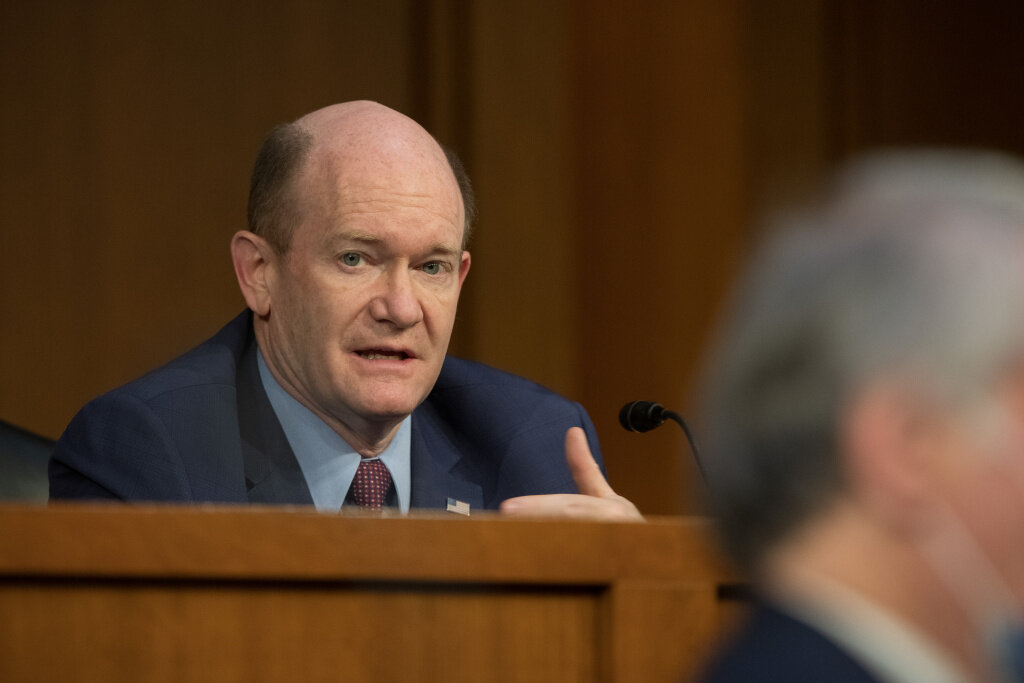Sen. Coons and colleagues introduce bipartisan bill to help law enforcement de-escalate mental health crises
April 5, 2022
WASHINGTON — U.S. Senator Chris Coons (D-Del.), co-chair of the Senate Law Enforcement Caucus, today joined Senators Sheldon Whitehouse (D-R.I.), John Cornyn (R-Texas), and five of their colleagues in introducing the Law Enforcement De-escalation Training Act, bipartisan legislation to help law enforcement respond more effectively to people suffering mental or behavioral health crises.
The bill would improve training for police officers interacting with individuals dealing with mental or behavioral health issues, including using de-escalation tactics and alternatives to force as well as working with mental health professionals on crisis intervention teams. It would also empower police and the mental health professionals working with them to link individuals to mental and behavioral health services in their community.
“Too often in communities around the country, we task police officers with responding to individuals with mental health issues in our communities without giving them the resources to provide appropriate care,” said Senator Coons, co-chair of the Senate Law Enforcement Caucus. “On both sides of the aisle, we agree on the importance of improving resources for those experiencing mental or behavioral health crises in our communities. By helping to connect police officers with health providers and emergency services, this bipartisan bill would create better outcomes – both for law enforcement and for those in need of support.”
“Too often, police respond when someone is suffering a mental health or behavioral health issue, yet lack the resources they need to do so effectively. We can save lives by equipping officers to recognize and respond appropriately to those situations, to work with mental health professionals, and connect people to treatment,” said Senator Whitehouse. “I’m pleased to join with Senator Cornyn on this important bill.”
“We ask law enforcement in our communities to wear too many hats, including that of mental health provider, and they often do not have enough resources or training to provide the level of care individuals in crisis need,” said Senator Cornyn. “We must give them the necessary tools so officers feel supported while helping those experiencing mental health emergencies and other crises, and this legislation would do just that.”
Underfunded and overworked mental and behavioral health systems often leave the police to confront people who urgently need mental or behavioral health care. But many police departments don’t train officers on how to deal with such situations, leading to encounters that are dangerous for all involved.
In response, a growing number of communities have developed community intervention programs to help law enforcement address mental or behavioral health crises. These programs connect officers on the street with mental and behavioral health providers and hospital emergency services.
In addition to protecting officers and communities, these programs reduce arrests and prison time for people in need of mental or behavioral health treatment. This is better for the individual facing mental or behavioral health challenges and can save governments on prison costs. As the National Alliance on Mental Illness has observed, an inmate in Detroit battling mental illness costs $31,000 a year in jail, while mental health treatment costs only $10,000 a year in the community.
At a minimum, all police officers should be equipped with the skills to respond to people with mental or behavioral health issues safely and with compassion.
To improve officer training on mental and behavioral health, and to promote community intervention programs, the Bipartisan Law Enforcement De-escalation Training Act would:
- Require the Department of Justice’s Office of Community Oriented Policing Services to develop curricula in the training topics, or identify existing curricula, in consultation with law enforcement, mental health organizations, family advocacy organizations, and civil liberties groups, among other stakeholders;
- Authorize $70 million in annual grant funding for training, including scenario-based exercises and evaluative assessments; and
- Require the National Institute of Justice and the Government Accountability Office to evaluate the implementation of the program and the effect of the training, to ensure that the curricula have a tangible impact on law enforcement encounters with people in crisis, and identify possible changes that would further improve outcomes.
The bill is endorsed by the National Criminal Justice Association, National Association of Counties, American Psychological Association, National Alliance on Mental Illness, American Counseling Association, National Register of Health Service Psychologists, American Association of Suicidology, Major Cities Chiefs Association, Major County Sheriffs of America, National Association of Police Organizations, National Sheriffs’ Association, the Fraternal Order of Police, the College of Psychiatric and Neurologic Pharmacists, the American Association on Health and Disability, the Lakeshore Foundation, the Anxiety and Depression Association of America, the American Association for Psychoanalysis in Clinical Social Work, the Maternal Mental Health Leadership Alliance, the National Association of Pediatric Nurse Practitioners, the National Association of County Behavioral Health and Developmental Disability Directors, the National Association for Rural Mental Health, and the Niskanen Center.
In addition to Senators Coons, Whitehouse, and Cornyn, the bill was co-sponsored by Senators Bill Cassidy (R-La.), Maggie Hassan (D-N.H.), Tim Scott (R-S.C.), Shelley Moore Capito (R-W.Va.), and Amy Klobuchar (D-Minn.)
The full text of the bill can be found here [whitehouse.senate.gov].


